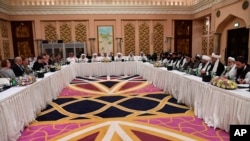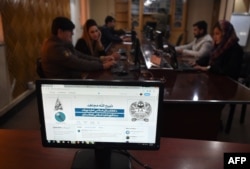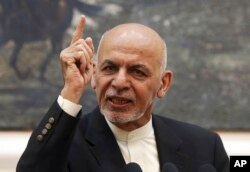Afghan Taliban are "exhausted" with the failed efforts to organize an intra-Afghan conference in Doha, so another such conference seems unlikely in the near future, a source close to the Taliban told VOA on the condition of anonymity.
The conference, which was scheduled to be held April 20 and 21 in the capital of Qatar, was supposed to provide a breakthrough as members of the sitting Kabul administration were going to be a part of talks with the Taliban for the first time.
It was canceled at the last minute over the size and make-up of the Afghan delegation. The Afghan government had issued a list of 250 participants, a list Taliban spokesman Zabiullah Mujahid claimed was more suited to a wedding party than a conference.
The Afghan government rejected suggestions by the Qatari government to reduce the size of the delegation, calling it "a disrespect to the national will of the Afghan people."
"Despite tireless and well-intentioned efforts of all parties, a shared understanding on how to achieve inclusivity couldn't be reached," tweeted Sultan Barakat, the director of the Center for Conflict and Humanitarian Studies that was helping organize the conference.
However, interviews with Taliban sources and a subsequent statement by Mujahid showed that the size of the Afghan delegation was not as concerning for the Taliban as how they felt about the posturing of the Kabul administration ahead of the meeting.
"Just as all the arrangements for the conference were finalized, the Kabul administration officials launched their own bizarre meetings inside the Arg palace (presidential palace), announcing their red lines and conditions, claiming host status for the conference," Mujahid's statement said.
The Taliban also objected to President Ashraf Ghani and his special envoy Umar Daudzai declaring that members nominated by them would participate as representatives of the Kabul administration rather than in their personal capacity.
The Afghan Taliban have long resisted direct talks with the administration of President Ghani, calling it a "puppet" of the Americans.
"Nothing is in their hands. They are helpless. There is no use talking to them," the source close to the Taliban mentioned earlier when asked why the Taliban refused to engage with the Afghan government.
In addition, Afghanistan is gearing up for a presidential election in September and the Taliban do not want to give an edge to any particular candidate, according to Zalmay Khalilzad, the chief U.S. negotiator who has been engaged with the Taliban since September in an effort to find a negotiated solution to the conflict in Afghanistan.
"The Talib preference is not to sit with the government alone because they think that will give the government legitimacy and be favorable to one of the candidates, the president in his re-election campaign," Khalilzad said during a talk at the United States Institute of Peace, a Washington based think tank.
However, some Afghans think the Taliban should not have a say in who represents them.
"Before any conferences to be held, there should be a solid agreement between the parties, specifically Taliban and the United States," said Najibullah Azad, a university professor in Kabul. "Taliban should have no right to reject any person or a group that is part of a delegation."
Others believed the failure of the talks as well as the turmoil leading up to them laid bare the deep fissures among the Afghan political elite that may undermine a possible peace process.
"One thing the messy lead-up to the Doha 'intra-Afghan' from all sides has proven beyond doubt ... is just how deeply divided Afghanistan's political elite are & how even the biggest national opportunities are hostage to small power games," tweeted Mujib Mashal, a New York Times correspondent in Kabul.
At stake, in an election year, is how various parties feel this conference, or any part of the peace process, might impact their political status.
Several presidential candidates, including CEO Abdullah, have boycotted a Loya Jirga, or a grand assembly of thousands of Afghans from across the country, scheduled for April 29, that was supposed to discuss the Afghan peace process.
Analysts say the opposition candidates fear Ghani might use the platform to boost his status as a national leader and, therefore, his election campaign.
Meanwhile, Ghani fears the opposition is using the Taliban refusal to engage with him to undermine him politically.
The insurgent group has had contacts with Afghan politicians, war lords, and others, but not the Ghani administration. The last "intra-Afghan" conference between Taliban and Afghan stakeholders was held in Moscow and officials of the Ghani administration were not invited.
The militants have also been negotiating with the Americans since last year. According to Afghan and international media, Ghani has been feeling sidelined in the peace process since September last year, when Khalilzad took over direct negotiation with the Taliban.
The administration's frustration became evident when Hamdullah Mohib, Ghani's national security adviser, lashed out at Khalilzad during a trip to the U.S. in March of this year. It resulted in the U.S. administration telling Ghani that it will not deal with Mohib anymore.
With the failure of the crucial Doha conference, the focus has already started shifting to the Jirga meeting at the end of the month.
"New political battle lines being drawn ahead of controversial Jirga & govt elex agenda after #DohaAfghanTalks debacle? What is national strategy to resolve issues?" tweeted Omar Samad, a senior adviser to Afghan Chief Executive Abdullah Abdullah.







